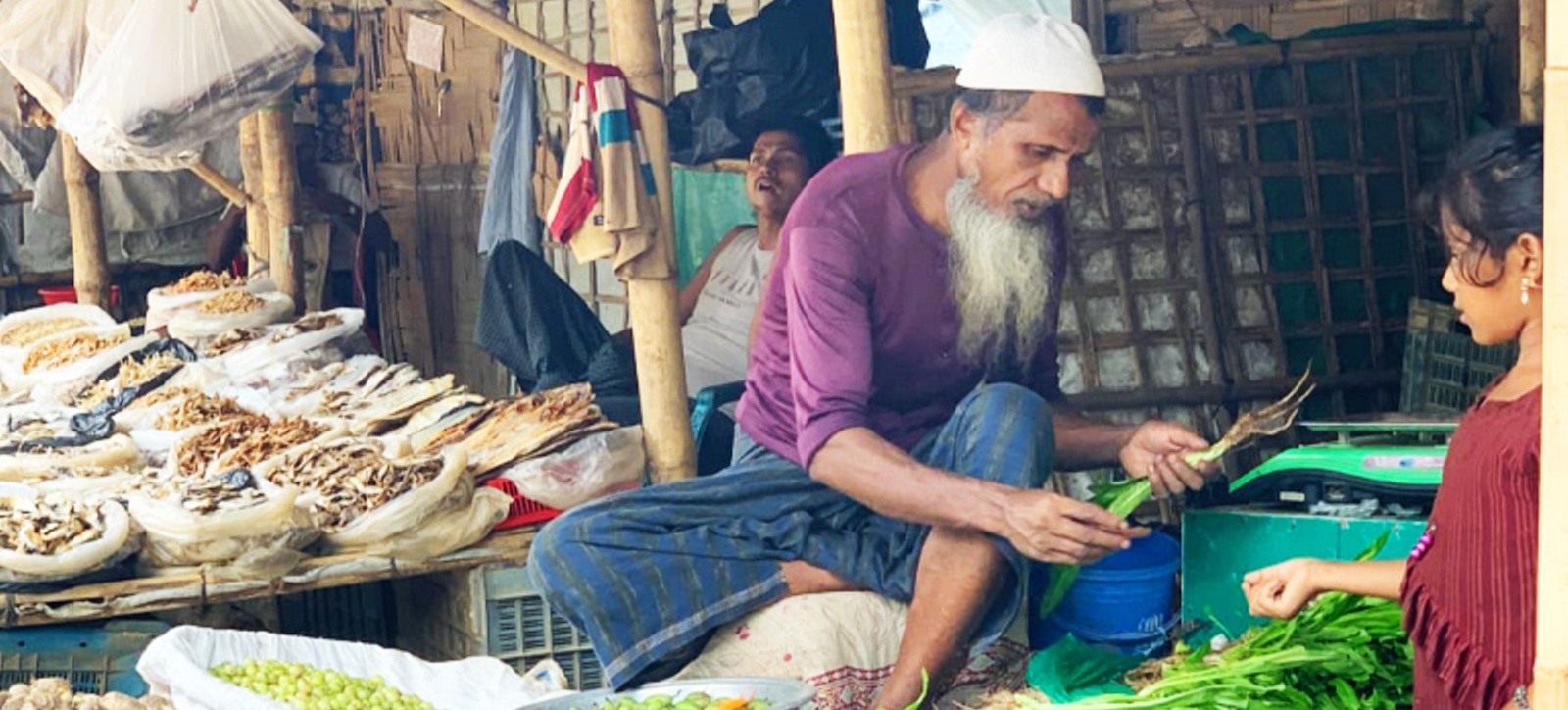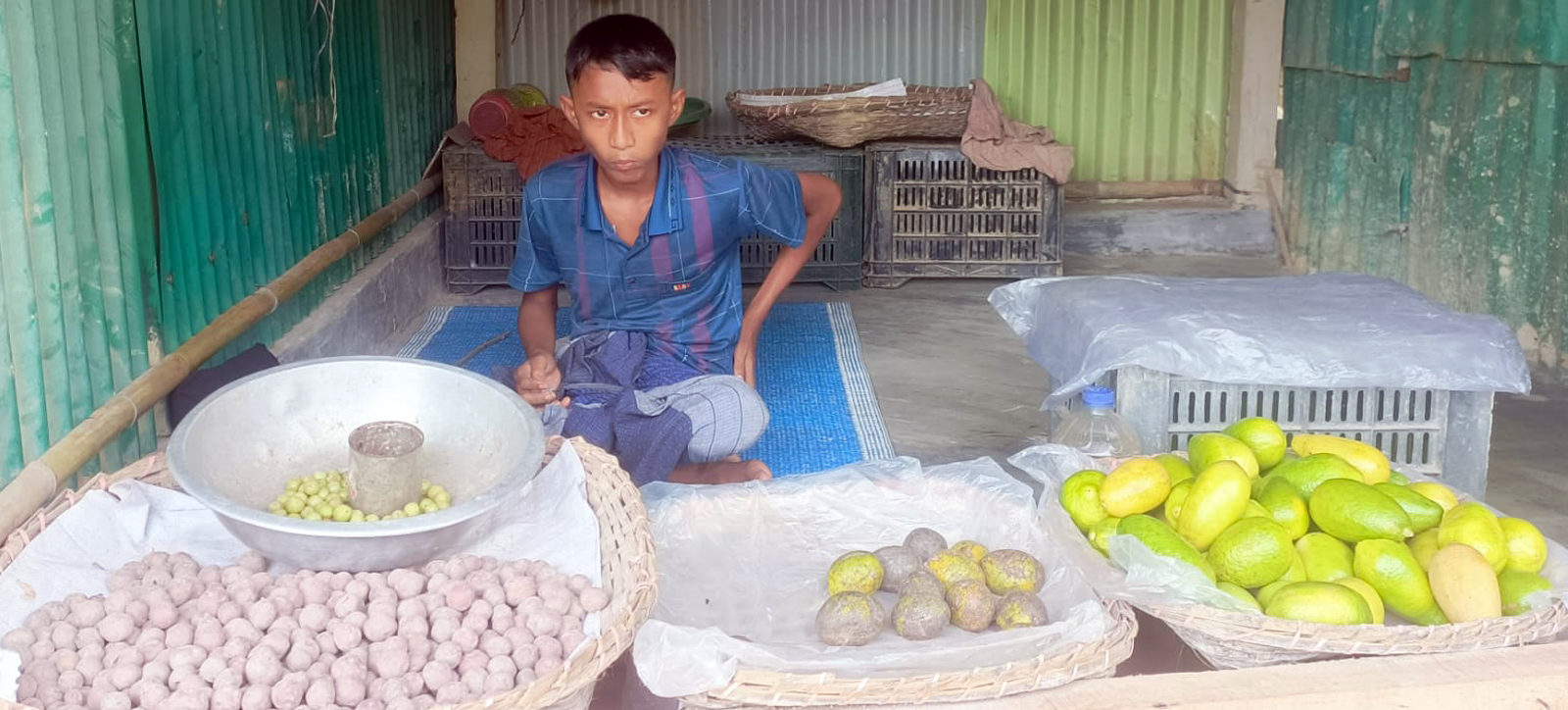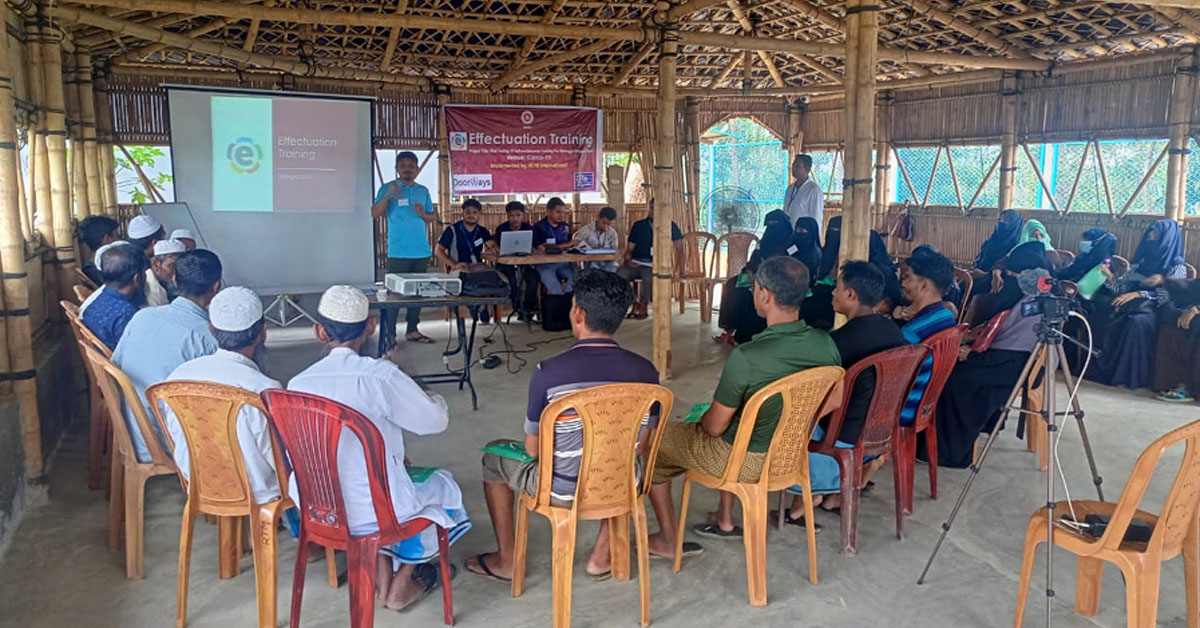
Nur Muhammad: The 60-year-old says the entrepreneurial training helped him to become more future-oriented
When he first arrived in the sprawling Rohingya refugee camp in southern Bangladesh, Muhammad Solim struggled to find regular work, relying on occasional labouring jobs.
The exile from Myanmar (also called Burma) knew he had to find another way of supporting his wife, two daughters and son.
But soon, help was at hand from an entrepreneurial training initiative backed by Warwick Business School, and he now makes a living from a successful fresh food and vegetable shop.
It was a project set up by Katrin Smolka, Assistant Professor at Warwick Business School, together with Austin Davis of American University in the US, Pursey Heugens, of Erasmus University in the Netherlands, Mona Mensmann, of the University of Cologne in Germany, and SM Musa, of Singapore Management University.
Barred from working legally in Bangladesh itself, helping refugees build businesses for themselves within the Kutupalong refugee camp was seen as a way for them to build a sense of economic independence.
“We were looking at how to build an entrepreneurial mindset and a spirit of self-reliance amongst the displaced Rohingya people despite all the trauma they have experienced in the past and the obstacles they face living in the world’s largest refugee camp,” says Dr Smolka.
Amid a brutal military crackdown on the Rohingya Muslim minority in Myanmar that the UN has described as ethnic cleansing, hundreds of thousands of Rohingya have fled across the border to Bangladesh in the past seven years, swelling the population in Kutupalong in the port city of Cox’s Bazar to nearly a million.
Supported by finance from the University of Warwick’s Research Development Fund Strategic Award and other sources such as the Abdul Latif Jameel Poverty Action Lab, Dr Smolka and her four research colleagues ran a pilot ‘self-sustenance skills’ project between May and August 2023 with around 150 Rohingya refugees. The idea was to generate learnings for the implementation of a much larger scheme among more than 2,000 participants in the near future.
Solim was one of those recruited for the pilot study, receiving 12 three-hour training sessions in entrepreneurship spread across six weeks.
In contrast to traditional business programmes which often concentrate on things like pricing and accounting, Solim and his fellow participants received two alternative styles of training focused on developing an entrepreneurial mindset. One was personal initiative training while the other approach was a decision-making logic called effectuation.

Solim himself received the effectuation training, which Dr Smolka developed specifically for the project in consultation with the renowned founder of the theory, Saras Sarasvathy, Professor in Business Administration at the University of Virginia.
“Effectuation is all about handling uncertainty,” says Dr Smolka.
One of its key principles is called ‘bird in hand’, which encouraged Solim to start a venture with the resources he had at his disposal.
Solim began his own fresh food and vegetable shop with 5,000 Bangladeshi Taka (about £32) that he had saved by cutting unnecessary expenses. He secured a spot near a road for 1,300 Taka per month, a strategic location for attracting customers.
With this modest start, he grew his shop’s sales to 8,000–10,000 Taka. His shop now stocks a variety of products, including dry fish, betel nuts, lemons, potatoes, cucumbers, and other fruit and vegetables.
Another principle of effectuation is ‘crazy quilt’. “The crazy quilt principle is focused on building partnerships rather than beating competitors,” says Dr Smolka. “It chimes quite well with another effectuation principle, ‘affordable loss’, which is about focusing only on what one can afford to lose when building a new venture.”
How entrepreneurs overcome barriers
While Solim is busy building a loyal customer base for his ventures, another refugee is making great strides after receiving personal initiative training. This, like the effectuation training, was delivered mainly by Rohingya from the refugee population in the camp itself, who were trained by the research team.
With his advancing years, Nur Muhammad, 60, needed an alternative to labouring to support his family of five. He could not chop wood or carry out other backbreaking tasks forever.
He had already started a makeshift shop when the programme began but with no prior experience in starting a business, he merely copied what others were doing, with poor results.
The personal initiative curriculum coached Nur to develop a self-starting, entrepreneurial mindset; to be persistent in overcoming barriers; and to be future-oriented, identifying problems and opportunities that might arise in the future and preparing for them in the present.
After the training, the refugee from Rakhine state in Myanmar realised that he could differentiate himself by offering vegetables that his competitors were not selling, and was soon expanding his business. Key to this was testing the market with new products. When he noticed that people were buying certain vegetables, he gradually increased his stock.
“I identified business opportunities and conducted experiments to pursue them,” Nur says.
The training “taught me to be future-oriented,” he adds.
“The whole emphasis is on vulnerable people building a better future for themselves, especially as their past has been so difficult,” says Dr Smolka.
Before the Burmese military started attacking Rohingya communities, Nur made a living by farming and by breeding fish in his local lake near Tha Bi Daung village in the Rathedaung Township, situated on the western coast of Myanmar.
How starting a business can bring social inclusion
Both Solim’s and Nur’s shops are now thriving. Solim plans to continue growing his business by reinvesting his savings while Nur has become adept at managing resources using ‘plan B’ strategies. These have included negotiating with suppliers to obtain 10,000 Taka worth of vegetables, keeping half on credit and paying the suppliers after selling the products.
But the self-sustenance programme is not only about growing a small-scale business, according to Dr Smolka.
“Entrepreneurship has a strong social dimension to it too because starting a business can bring with it social inclusion,” she says. “The entrepreneur becomes valued by their community.”
“It also brings agency to people who don’t have other employment opportunities. Not all entrepreneurs are in the Elon Musk mould. For many it is about basic things like ensuring your children can go to school.
“All of which demonstrates that the entrepreneurial mindset programmes can have effects far beyond the six weeks allocated to them, and extending beyond the participants themselves to family, friends and community.”
Dr Smolka and her research partners have been following the progress of Nur and other refugees in the two strands of training offered through the self-sustenance programme.
The team have also evaluated the recruitment of women during the pilot study given the conservative values of the Rohingya community and the relative lack of opportunities for females in that environment.

All in all, the aim is to establish the feasibility, the benefits and the costs, of entrepreneurial mindset training in order to give guidance on the value of these interventions to policymakers and NGOs, who may be able to deliver them at scale – in and beyond refugee camps.
“The challenge now is to turn this pilot project into implementation, but we need more funding to do that,” says Dr Smolka.
“This requires everyone to see the importance of building an entrepreneurial mindset, and how it can transform lives.”
Katrin Smolka is Assistant Professor of Entrepreneurship and Innovation. She teaches Entrepreneurship and New Venture Creation on the Executive MBA and Executive MBA (London) as well as the Global Online MBA and the Global Online MBA (London).
She also teaches Entrepreneurial Mindset on the BSc Management, BSc International Management and BSc Accounting and Finance programmes.
In addition, Dr Smolka teaches Entrepreneurship and Business Venturing on the MSc Marketing & Strategy, MSc Business with Operations Management, MSc International Business and the MSc Business with Marketing courses.
Discover more about Entrepreneurship by subscribing to our free Core Insights newsletter.




 X
X Facebook
Facebook LinkedIn
LinkedIn YouTube
YouTube Instagram
Instagram Tiktok
Tiktok